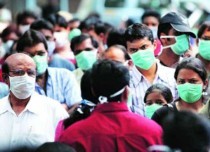New York, May 19: Cigarette smoke spurs the lungs to make more of the receptor protein which the novel coronavirus uses to enter human cells, according to a study which suggests that quitting smoking might reduce the risk of a severe coronavirus infection.
The findings, published in the journal Developmental Cell, may explain why smokers appear to be particularly vulnerable to severe COVID-19 disease.
"Our results provide a clue as to why smokers who develop COVID-19 tend to have poor clinical outcomes," said study senior author Jason Sheltzer, a cancer geneticist at Cold Spring Harbor Laboratory in the US.
"We found that smoking caused a significant increase in the expression of ACE2, the protein that SARS-CoV-2 uses to enter human cells," Sheltzer said.
According to the scientists, quitting smoking might reduce the risk of a severe coronavirus infection.
They said most individuals infected with the virus suffer only mild illness, if they experience any at all.
However, some require intensive care when the sometimes-fatal virus attacks, the researchers said.
In particular, they said three groups have been significantly more likely than others to develop severe illness -- men, the elderly, and smokers.
Turning to previously published data for possible explanations for these disparities, the scientists assessed if vulnerable groups share some key features related to the human proteins that the coronavirus relies on for infection.
First, they said, they focused on comparing gene activity in the lungs across different ages, between the sexes, and between smokers and nonsmokers.
The scientists said both mice that had been exposed to smoke in a laboratory, and humans who were current smokers had significant upregulation of ACE2.
According to Sheltzer, smokers produced 30-55 per cent more ACE2 than their non-smoking counterparts.
While the researchers found no evidence that age or sex impacts ACE2 levels in the lungs, they said the influence of smoke exposure was surprisingly strong.
However, they said, the change seemed to be temporary.
According to the data, the level of the receptors ACE2 in the lungs of people who had quit smoking was similar to that of non-smokers.
The study noted that the most prolific producers of ACE2 in the airways are mucus-producing cells called goblet cells.
Smoking is known to increase the prevalence of such cells, the scientists said.
"Goblet cells produce mucous to protect the respiratory tract from inhaled irritants. Thus, the increased expression of ACE2 in smokers' lungs could be a byproduct of smoking-induced secretory cell hyperplasia," Sheltzer explained.
However, Sheltzer said other studies on the effects of cigarette smoke have shown mixed results.
"Cigarette smoke contains hundreds of different chemicals. It's possible that certain ingredients like nicotine have a different effect than whole smoke does," he said.
The researchers cautioned that the actual ACE2 protein may be regulated in ways not addressed in the current study.
"One could imagine that having more cells that express ACE2 could make it easier for SARS-CoV-2 to spread in someone's lungs, but there is still a lot more we need to explore," Sheltzer said.







Comments
Add new comment